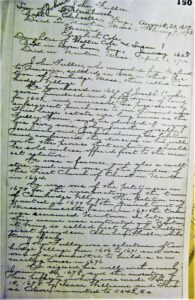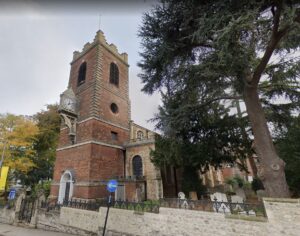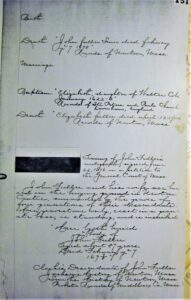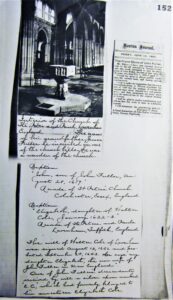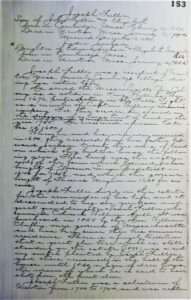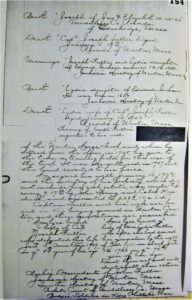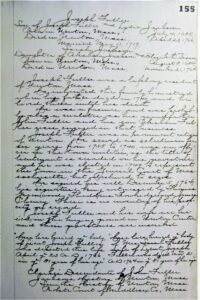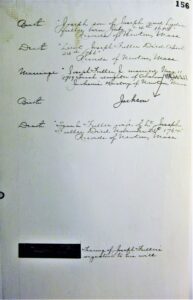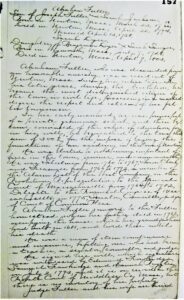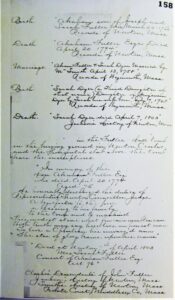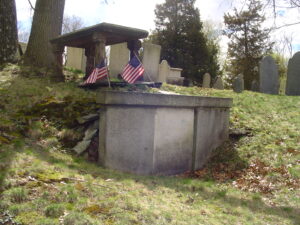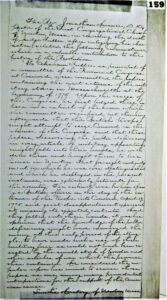Judge Abraham Fuller and Ancestors[1]
The following research notes and family tree were located in the ‘Fuller Family Papers 1729-1950’ file in the archives of the Jackson Homestead and Museum located at 527 Washington St, Newton, MA, USA. The research is unsigned and undated, however there is a date of 1899 imbedded in page 4 of the narrative blow. The author/researcher was likely a descendent of Judge Abraham Fuller as the research ends with much information about the Judge and the tree begins with his great grandfather, John Fuller of Newton.
The birth date and place for John Fuller of Newton have not been identified to date. The current and commonly used birth date of 1611 was calculated from the death date of 1689 and the age of “about 78” taken from his gravestone and was used for the entry in the Town and Vital Records for Newton, MA, USA. The following research and family tree begins with a baptism date and place for John Fuller of Newton which is not familiar to this researcher.
The research was transcribed as written with no cross reference with Vital Records, History Books, etc. However, we found the information to be accurate and consistent with our understanding of dates, people, relationships and situations, except as noted
Page 1
John Fuller son of John Fuller; Bapt. in St Peters Church, Colchester, Eng. August, 28, 1617;[2] Died in Newton, Mass, February 7, 1697/8.
Married, Elizabeth Cole, Daughter of Walter Cole and Suzan ?, Bapt. in Lavenham, Eng January 1622/3. Died in Newton, Mass, April 13, 1700.
John Fuller, who emigrated from England to America, settled in 1644 in that portion of Cambridge, Mass, then called Cambridge Village.
He purchased in 1658 of Joseph Cooke seven hundred and fifty acres of land for 160 £ and increased his possessions by subsequent purchases to over a thousand acres. This large estate was long known as the Fuller Farm, and he divided it among is five sons, John, Jonathan, Joseph, Jeremiah and Joshua during his lifetime and confirmed the division in his will, with the proviso that no portion should be sold unless offered first to the nearest relative.
He was a farmer, and also a maltster, and was one of the founders of the First Church of Christ in Newton in 1664.
He was one of the petitioners in 1678 for the incorporation of the town on of Cambridge Village. The petition was granted in 1679 by the General Court of Massachusetts, and in 1691 the town was renamed Newtown. In later years this name was contracted into Newton, it being so called first by John Fuller’s great grandson Abraham Fuller, while town clerk.
John Fuller was a selectman of Cambridge Village from 1686 to 1691, and was one of a committee to build a new meeting house in 1696.
He signed his will, with a mark January 30, 1695/6 and the inventory of his property, which was made February 15, 1697/8 by Isaac Williams and Thomas Oliver amounted to 534 £ 5 s.
________________________________________________________________________________
1. Our title is based on the content.
2. The original document from St Peter’s Church, Colchester, UK (ERO# D/P 178/1/1) as transcribed by Diana Spelman, Norwich, Norfolk, UK: “Christnings [sic], 1617, John the sonne of John Fuller bapt’ Aug’ xxviij th. [28th].” The usual convention was to show the last “i” in a roman numeral ending in an “i” with a long tail, which in this case has been transcribed as a “j”. The descendants of John Fuller of Newton would have liked this record to read: ‘John Fuller the son of John Fuller, etc., who was born in 1562/3 in Lavenham, Suffolk, UK.’
Given the accuracy of the rest of information in the research material, we think this date should be considered credible. Perhaps the author had a family bible or other credible information passed down. Colchester is a logical place to find the Fuller family as several members of Elizabeth Cole’s family migrated to Colchester. John’s grandfather, James, named John Fuller of Colchester as the executor of his will.
Page 2
[Actual Text]
Birth:[3]
Death: “John Fuller Senir died February ye 7 1698” – Records of Newton Mass.
Marriage:[4]
Baptism: “Elizabeth, daughter of Walter Cole January 1622/3” – Records of Sts Peters and Pauls Church, Lavenham, England.[5]
Death: “Elizabeth fuller died April: 13: 1700.” – Records of Newton Mass.
Tracing of John Fuller’s autograph; signed June 22, 1676 on a petition to the General Court of Mass. [Image on original document]
John Fuller and his wife[6] are buried in the burying ground in Newton Centre, surrounded by the graves of four generations of their descendants. His gravestone only, reset in a granite base, is standing and inscribed
“Here lyeth buried
ye body of
John Fuller
Aged about 87 years
Died February ye 7
1697/8”
[Sources]
Clarke’s Descendants of John Fuller. [pub 1869]
Jackson’s History of Newton, Mass. [pub 1854]
Smith’s History of Newton Mass. [pub 1880]
Probate Records of Middlesex Co., Mass.
______________________________________________________________________________
3. This area is blank; see the Actual Text section on page 3.
4. This is blank; we also have not found the marriage record to date.
5. The correct name is ‘The Parish Church of St Peter and St Paul, Lavenham, Suffolk, UK.’
6. The Vital Records for Newton show her death date, but neither those records nor the official interment list, show that she was buried in the East Parish Burying Ground in Newton.
Page 3
Interior[7] of the Church of Sts. Peter and Paul, Lavenham, England. The name of his grandfather, James Fuller[8] is inscribed on one of the church bills. He was a warden of the church.
[Actual Text]
Baptism: “John, son of John Fuller, August 28, 1617.” – Records of St Peter’s Church, Colchester, Essex, England.[9]
Baptism: “Elizabeth, daughter of Walter Cole, January 1622/3.” –
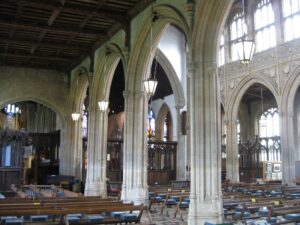 Records of Sts. Peters and Pauls, Lavenham, Suffolk, England.[9]
Records of Sts. Peters and Pauls, Lavenham, Suffolk, England.[9]
The will of Walter Cole of Lavenham was signed Aug 13, 1652 and probated Sept 24. 1653. It says “my daughter Elizabeth, the now wife of John Fuller in New England.”
One of John Fuller’s descendants survived by will a silver spoon marked “E.C,” which has formerly belonged to his ancestor Elizabeth Cole.
___________________________________________________________________________________
7. The picture in the research was taken inside the church in Lavenham as is verified by our 2013 photo. Our picture was taken from the left side and the picture in the research was taken from the right side in the church. Included in the research is the 1892 clip from the newspaper regarding the gravestone of John Fuller of Newton. https://johnfullerofnewton.com/cemeteries/middlesex/east-parish-burying-ground/john-fuller/
8. Our research had concluded that James Fuller was the most likely grandfather of John Fuller of Newton. James Fuller did have a son, John b. 1562/3, which validates the St Peter’s Church record: https://johnfullerofnewton.com/ancestral/about-john/ancestral-line/
9. This indicates the author/researcher has seen these church records because their wording follows the actual wording in each of the parish records. We know from the picture they were in the Lavenham church.
Page 4
Joseph Fuller, Son of John Fuller and Elizabeth. Born in Cambridge, Mass., February 10, 1652. Died in Newton, Mass., January 5, 1739/40. Married
December 13, 1680, Lydia Jackson, Daughter of Edward Jackson and Elizabeth Newgate. Born in Cambridge, Mass., 1656, Died in Newton Mass., January 12, 1725/6.
Joseph Fuller was a resident of Newton, Mass., formerly Cambridge Village during his entire life. He served the Massachusetts Bay Colony as a soldier in King Philipe’s War in 1676. Participating in the “Falls Fight” as a member of Captain William Turner’s company. For this service, he shared in the division of a large tract of land in the western part of the Province of Massachusetts year 1735. He was made a freeman, October 13, 1680.
When he and his wife were married in 1680, they received from her father, Edward Jackson, twenty-three acres of land on which they built a house the following year. This land was the western end of the farm which Edward Jackson bought of Governor Simon Bradstreet in 1646 for 140 £, and which the governor bought of Thomas Mayhew in 1638 for six cows.
Joseph Fuller lived on this estate for the remainder of his life, and it descended to his son, grandson and great granddaughter Sarah Fuller who married Colonel William Hull. It was purchased in 1855 by the Hon. William Claflin, once governor of Massachusetts and has been since then his summer residence. There is a family tradition that a great elm tree which is still standing on the estate (1899)[10] was a seedling switch planted by Joseph Fuller. And there remained in the hall of the house until 1830 a pair of deer horns, the wearer of which is said to have been shot from the front door.
Joseph Fuller was a selectman of Newton from 1700 to 1704, and was captain of the Horse Troop, and when he retired from the office in 1735, he gave to the town a training field for the use of the troop. It was discontinued in 1787, and the land revered to his heirs.
___________________________________________________________________________________
10. We assume the insertion of 1899 means ‘as of 1899’ which we assume to be the date of the research.
Page 5
[Actual Text]
Birth: “Joseph [s] of Jno & Elizabeth 10:12:52” – Middlesex Co. Records of Cambridge, Mass. Death: “Capt Joseph fuller Dyed January 5, 1739/40” – Records of Newton, Mass. Married: “Joseph fuller and Lydia daughter of Edward Jackson married 13, 12, 1680.” – Jackson’s History of Newton, Mass.
Birth: “Lydia daughter of Edward Jackson sr. was born in 1656” – Jackson’s History of Newton, Mass. Death: “Lydia wife of Capt Joseph Fuller dyed January 12 1725/6” – Records of Newton, Mass.
Tracing of Joseph Fuller’s signature to his will. [Image on original document]
He signed his will January 16, 1732/3, and the inventory of his property, which did not include his real estate, was made February 9, 1739/40 by John Spring and Caleb Kendrick, and amounted to 269 £ 10s. 6d.
Captain Fuller and his wife are buried in the burying ground in Newton Centre, and their gravestones are inscribed:
| “Here lyes Buried ye Body of Capt. JOSEPH FULLER; Who departed this Life, Janry. 5th Anno Domni 1739/40 in ye 88th Year of His Age.” |
“Here lyes Buried ye Dust thou art, and unto Dust thou shall return.” |
[Sources]
Clarke’s Descendants of John Fuller. [pub 1869]
Jackson’s History of Newton, Mass. [pub 1854]
Smith’s History of Newton Mass. [pub 1880]
Probate Records of Middlesex Co., Mass.
Bodge’s Soldiers in King Phillip’s War [pub. 1891]
Page 6
Joseph Fuller son of Joseph Fuller and Lydia Jackson, Born in Newton, Mass.,
July 4, 1685, Died in Newton, Mass., April 23, 1766; Married May 11, 1719, Sarah Jackson Daughter of Abraham Jackson and Elizabeth Bisco; Born Newton, Mass., August 8, 1684[11], Died in Newton, Mass., November 21, 1764.
Joseph Fuller was a lifelong resident of Newton Mass. He inherited the family homestead when his father died in 1740, and he lived there until his death. He was a farmer, and was probably also a maltster, as his grandfather John Fuller and his son Abraham Fuller was engaged in that business.
Joseph Fuller was a prominent citizen of Newton. He served as selectman for six years from 1735 to 1740, was an officer in the town militia, as the title of lieutenant is recorded on his gravestone, and he was elected in 1749 to represent the town in the General Court of Massachusetts, but declined to serve.
He signed his will December 5, 1746, his signature being witnessed by Thomas Greenwood, Thaddeus Trowbridge and James Cheney. There is not inventory of his property on record. Joseph Fuller and his wife are buried in the burying ground in Newton Centre and their gravestones are inscribed:
| “Here lies buried ye Body of Lieut. JOSEPH FULLER who Departed this Life April ye 23 AD 1766 in ye 81 year of his Age” |
“Here lies buried ye Body of Mrs. SARAH FULLER [ye] Wife of Lieut. JOSEPH FULLER, who died Novm. 21t AD 1764 in ye 81st year of her Age” |
[Sources]
Clarke’s Descendants of John Fuller. [pub 1869]
Jackson’s History of Newton, Mass. [pub 1854]
Smith’s History of Newton Mass. [pub 1880]
Probate Records of Middlesex Co., Mass.
___________________________________________________________________________________
11. We cannot confirm this birth date for Sarah; Jackson’s History of Newton shows only a birth date of 1683 for her, on page 328. There is no birth date of 1684 in the family, but there is a birth date of Aug. 8, 1680 for daughter Elizabeth.
Page 7
[Actual Text]
Birth: “Joseph sone of Joseph and Lydia fuller born July ye 4th 1685”. – Records of Newton, Mass. Death: “Lieut. Joseph Fuller Died 23d 1766” – Records of Newton, Mass.
Married: “Joseph Fuller Jr. married May 11, 1719 Sarah daughter of Abraham Jackson” – Jackson’s History of Newton, Mass. Birth: ____, Death: “Sarah Fuller wife of Lt Joseph Fuller Died November 21t 1764” – Records of Newton, Mass.
Tracing of Joseph Fuller’s signature to his will. [Image on original document]
Page 8
Abraham Fuller Son of Joseph Fuller and Sarah Jackson, Born in Newton Mass., March 23, 1719/20. Died in Newton Mass., April 20, 1794.
Married April 13, 1758.
Sarah Dyer Daughter of Benjamin Dyer and Sarah Sawyer, Born in Weymouth, Mass., July 7, 1728, Died in Newton, Mass., April 7, 1803. Died in Newton, Mass., April 7, 1803.
Abraham Fuller, who was descended from an honorable ancestry, was a resident of Newton, Mass. During his entire life. In his later years, during the Revolution, he became the most distinguished citizen of the town in civil life, possessing in a marked degree the respect and esteem of his fellow townsmen,
In his early manhood, he was principal of a private grammar school, and then became convinced of the value of education, for in his will, he bequeathed to the town the sum of 300 £ “for the purpose of laying the foundation of an academy in the town of Newton.”
He was elected to hold many important offices in the town, province, and commonwealth. He was Selectman for 1760 to 1767, Town Clerk and Treasurer from 1766 to 1792, a member of the “Alarm List” of the West Company in the Revolution Representative to the General Court of Massachusetts from 1764 to 1782, Delegate to the Provincial Congress of Massachusetts in 1775, Senator Councillor Judge of Court of Common Pleas. Abraham Fuller moved to the Fuller homestead when his father died in 1766, occupying the house which his grandfather had built in 1681, and lived there until his death.
He was a man of stern countenance and manner, befitting one who had been a teacher, a senator, councillor and judge. He signed his will, which signature was witnessed by Edmund Trowbridge, Samuel Trowbridge and Hannah Ruggles, on July 2, 1793, an it is on record in the Probate Court of Middlesex Co. Mass., but there is no inventory of his property.
Page 9
[Actual Text]
Birth: “Abraham Son of Joseph Fuller and Sarah Fuller born March 23, 1719/20.” – Records of Newton, Mass. Died: “Abraham Fuller Esq Died April 20, 1794” – Records of Newton, Mass.
Marriage: “Abraham Fuller & Sarah Dyer married by Mr Smith April 13, 1758” – Records of Weymouth, Mass.
Birth: “Sarah Dyer (a Third Daughter of that name) Daughter of Benjamin Dyer by Sarah his wife born July 7, 1728” – Records of Weymouth, Mass. Death: “Sarah Dyer died April 7, 1803” – Jackson’s History of Newton, Mass.
Judge Fuller and his wife are buried in the Fuller – Hull tomb in the burying ground in Newton Centre and the horizontal slab above the tomb bears the inscriptions:[12]
| “In memory of the Hon Abraham Fuller Esq who died April 20 1794 Aged 75 He honorably discharged the duties of a representative, Senator, councillor & judge, a benefactor to the poor, a blessing to his family, to the town & to mankind This modest what free vain marbles can with truth may say here lies an honest man. To live a Christian his unwary’d [unwarded] aim. The star of glory beams upon his name” |
“Died at Newton 7th of April 1903, Mrs Sarah Fuller, Contort of Abraham Fuller Esq, Aged 76” |
[Sources]
Clarke’s Descendants of John Fuller. [pub 1869]
Jackson’s History of Newton, Mass. [pub 1854]
Smith’s History of Newton Mass. [pub 1880]
Probate Records of Middlesex Co., Mass.
_____________________________________
12. Judge Abraham Fuller’s body was placed in the Fuller-Hull Tomb in the East Parish Burying Ground, Newton, MA and it is our understanding the table was then added on the top of the Tomb to contain the inscription regarding his dates and message.
Page 10
The Rev. Jonathan Homer D.D., pastor of the First Congregational Church of Newton, Mass., in recording the death of Judge Fuller, after eulogizing his character, related the following circumstance, which is a valuable contribution to the history of the Revolution.
To Abraham Fuller as principal of the committee of the Provincial Congress at Concord, were committed the papers containing the exact returns of the military stores in Massachusetts at the beginning of 1775. Upon the access of the Congress, he first lodged these papers in a cabinet of the room which the committee occupied, but thinking afterwards that the British troops might attempt to siege Concord in the absence of the Congress, and that these papers, discovering the public deficiency in every article of the military apparatus, might fall into their hands, he withdrew them and brought them to his house in Newton. That foresight and judgment for which he was ever distinguished and which he displayed in the present instance, was extremely fortunate foe the country. The cabinet was broken open by a British officer on the day of the entrance of the troops into Concord, April 19, 1775 and great disappointment expressed at missing it expected contents. Had they fallen int their hands, it was his opinion that the knowledge of the public deficiency might have encouraged the enemy, at this early period of the struggle, to have made such a use of their military force as could not have been resisted by the small stock of powder and other articles of war which the province then contained. He considered the impulse upon his mind to secure those papers as one among many providential interpositions for the support of the American cause.
Smith’s History of Newton Mass. [pub 1880]
W.L. Fuller, Oct 22, 2022

